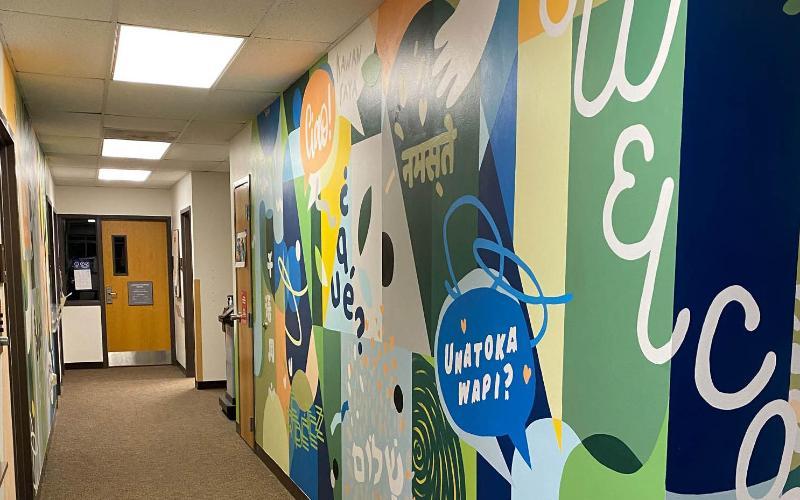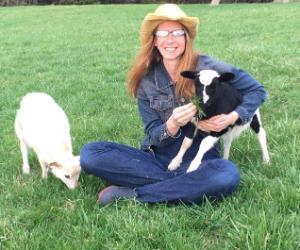
Aequitas Public Humanities and Art Program Details
The Aequitas Fellowship Program in Public Humanities and Arts is a theologically engaged creative studio. In it, students passionate about literature, art, languages, history, music, theater, theology, and philosophy partner with communities to make public projects in the humanities and arts.
Students selected for this fellowship receive a scholarship to take courses together, learn to design and make public projects together, and travel internationally together. As fellows, they connect with makers and scholars who engage the public, learning from their projects and techniques. As they advance, fellows pursue an internship in their chosen area of public humanities and arts. Their fellowship culminates in a capstone project that they design and implement.
The Aequitas Fellowship Program in Public Humanities and Arts can be fruitfully paired with other college programs like HNGR, Wheaton in Chicago, and study abroad. And students’ work in majors and minors and certificates feeds their fellowship work too, helping them focus on areas of interest and equipping them with specialized disciplinary methods that their fellowship brings into the public sphere.
Work in these fields allows fellows to speak into contemporary public issues, make and share knowledge, draw out communal memory, and advance culture. Ultimately, Aequitas Fellows in the Public Humanities and Arts join with communities to expand the scope and reach of the literature, history, philosophy, arts, and languages they love for Christ and His Kingdom.
The Aequitas Fellowship Program in the Public Humanities and Arts prepares students for lives of transformational creativity, cultural engagement, and community partnership as they practice humanities and arts in public spaces for God’s glory.
Program Courses and Experiences
Year One
- AQTS 121, Public Humanities and Arts Studio 1 (2, fall semester)
- ENGL 221, Contemporary Literary Conversations (4, (LE), fall semester)
- HIST 102, Exploring the Global Past or HIST 103, Exploring the American Past (4, (HP), spring semester)
Year Two
- AQTS 122, Public Humanities and Arts Studio 2 (2, fall semester)
- PHIL 217 Philosophy of Art ((4),(PI, VPA-V), fall semester)
- AQTS 221 Public Humanities and Arts Global Summer Experience (0)
Requirements that May Be Taken at Any Time
- One 300- or 400-level course in Modern and Classical Languages (4)
- 4 credits from among the following:
- ART 329: Community Art I ((4), offered each fall)
- COM 479: Theater and Culture (VPA (4), offered alternating years)
- ENGW 233/333: Writing Chicago, Writing for Social Change ((4), offered alternating years)
- HIST 205: Historical Tour of Modern Korea ((4), HP, GP), offered through Wheaton in Korea, offered alternating years)
- HIST 354: Race, Justice, and Reconciliation in US History (4)
- BITH 322 Theology and the Arts (offered each spring)
- AQTS 321, Internship in Public Humanities (approval required, can be for credit in another department/program) (0)
- AQTS 421, Public Humanities and Arts Capstone Project (approval required, can be for credit in another department/program) (0)
Year One:
The fellowship opens with Aequitas Public Humanities and Arts Studio I, in which students come together as diverse makers and scholars from a variety of interest areas around the theology, ideas, and methods of public humanities and arts. The course examines and practices the Public Humanities and Arts in light of God’s eschatological purpose for creation and human participation in that purpose. As it is a studio, special focus in the course will be on practicing methods for public humanities and arts projects from design through assessment, including community partnership. It allows students to profile PHA projects, host and interview PHA practitioners, and develop proposals for projects in the public humanities and arts. The course culminates in an all-cohort PHA project within the Wheaton community that is collaboratively developed from design to production through assessment.
Also during year one, Aequitas Fellows in Public Humanities and Arts share foundational courses in literature and history as exploratory foundations in methods from disciplines that feed into the public humanities and arts.
Year Two
In year two, Aequitas PHA fellows convene in a second studio course that allows for further theory and practice of public humanities and arts. Because it is a studio, practice of techniques associated with public humanities and arts is a continued focus here, and students choose practice foci among collection, documenting, oral history, public writing; and ethnography. The major work of the course is a collaborative, extended public philosophy project outside the Wheaton campus community, methods of which will be supported by a shared course in philosophy. The course culminates in student exploratory work toward internships and PHA capstone projects.
Summer Experience
Aequitas Fellows in the Public Humanities and Arts receive a funded or partially funded summer experience as part of their fellowship, taken after the spring semester of the second year. This experience may be the funded cohort summer experience (currently planned to be in Querétaro, Mexico) networking with and learning from community artists and humanities workers. Or, students with particular interests may choose a partially funded option, such as Wheaton in Korea (which focuses on communal history and memory), from an approved list.
Advanced Language Requirement
Students pursue languages beyond the regular language requirement at Wheaton for this fellowship, enriching their abilities in modern and classical languages of their choice. Advanced skills in modern languages help students pursue relationships with contemporary communities through conversation fluency as well as preparing students for study abroad, minors, and majors in languages. Advanced skills in classical languages may deepen their methodological strengths in history, biblical study, theological study, classics and comparative literary studies and offer opportunities for majors and minors in associated fields.
Electives
As a part of the certificate, students pursue elective course work in their specific areas of interest within the humanities and arts. In these courses, fellows achieve for themselves deepening methodological and canonical expertise in areas of interest. They achieve for the cohort a growing communal range of methods, genres, and expressions common to public humanities and arts, strengthening the community according to individual curiosity.
Internship
As they advance, Aequitas PHA fellows intern in a chosen domain of public humanities and arts. Students will complete a minimum of 60-hours of intern work in either a PHA-based organization or in a not-explicitly-PHA organization, if working toward particular PHA projects. This requirement may be met by any number of Wheaton program based internships, including but not limited to those offered in Wheaton in Chicago and HNGR. With approval, PHA-focused internships may be facilitated by any academic department for credit.
Capstone
An approved capstone project will complete the fellowship. Projects may include but are not limited to honors theses, peer-reviewed articles, community art projects, theater/directing projects (or dramaturgy for particular theater projects), HNGR independent study projects, exhibitions, digital humanities projects, documentaries, recitals, compositions, public writing projects, oral history projects, humanities/arts educational projects in various contexts, etc. Students begin background work on their project in AQTS 221 and will get approval for their project prior to beginning significant work. Students register for this course in the spring semester of the year they complete the project, and they will present their final projects with a theological reflection paper in the AQTS All Cohort Open Studio to engage the Wheaton community and broader public in the results of their work.
Public Humanities and the Arts Program Coordinator
 Tiffany Eberle Kriner, Ph.D. serves as Coordinator of the Aequitas Fellowship Program in the Public Humanities and Arts. She is associate professor of English at Wheaton College, where she's been on faculty since 2006. She graduated summa cum laude from Messiah College and earned an M.A. and Ph.D. in English at the University of Wisconsin-Madison, receiving a post-doctoral fellowship at the Erasmus Institute of the University of Notre Dame. At Wheaton, she teaches courses in American literature and writing and supports the Core Book program. Her research takes a theological approach to literature. She has published scholarly articles and book chapters on theological aspects of works by writers ranging from Marilynne Robinson to Lucille Clifton, Denise Levertov, and Fanny Howe. Her first book, The Future of the Word: An Eschatology of Reading (Fortress Press, 2014) argues that texts have futures in the kingdom of God that readers help cultivate--it considers classics and popular literature in the becoming of the Word and the love of the Trinity. Her current book project merges literary criticism with lyric essay and farm memoir as it cultivates literary texts for theological meanings from the setting of her family farm: Root and Sky Farm, in Marengo, IL.
Tiffany Eberle Kriner, Ph.D. serves as Coordinator of the Aequitas Fellowship Program in the Public Humanities and Arts. She is associate professor of English at Wheaton College, where she's been on faculty since 2006. She graduated summa cum laude from Messiah College and earned an M.A. and Ph.D. in English at the University of Wisconsin-Madison, receiving a post-doctoral fellowship at the Erasmus Institute of the University of Notre Dame. At Wheaton, she teaches courses in American literature and writing and supports the Core Book program. Her research takes a theological approach to literature. She has published scholarly articles and book chapters on theological aspects of works by writers ranging from Marilynne Robinson to Lucille Clifton, Denise Levertov, and Fanny Howe. Her first book, The Future of the Word: An Eschatology of Reading (Fortress Press, 2014) argues that texts have futures in the kingdom of God that readers help cultivate--it considers classics and popular literature in the becoming of the Word and the love of the Trinity. Her current book project merges literary criticism with lyric essay and farm memoir as it cultivates literary texts for theological meanings from the setting of her family farm: Root and Sky Farm, in Marengo, IL.

